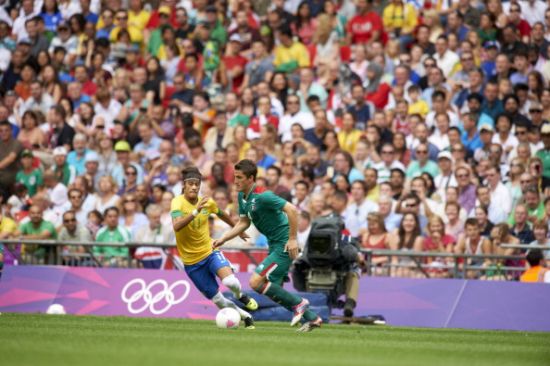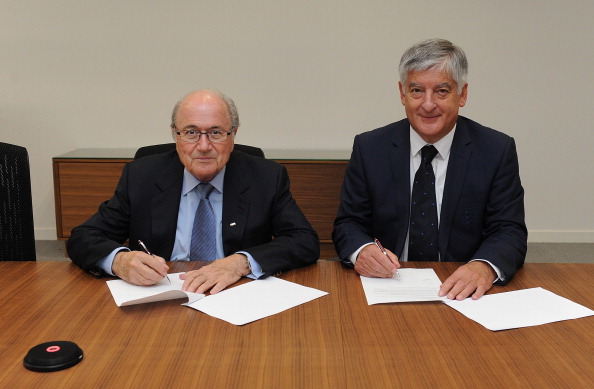By Andrew Warshaw at St. George’s Park at Burton-on-Trent
November 21 – FIFA President Sepp Blatter held out a hand of peace to English football today as both sides acclaimed a new spirit of conciliation and cooperation after a fractious period of disharmony and mistrust.
Following months of preparation and anticipation and amid considerable pomp and ceremony, Blatter paid a landmark visit to St. George’s Park, the English Football Association’s new state-of-the-art national centre, the most significant evidence yet of a thawing in the previously frosty dealings between the two parties.
Relationships between FIFA and the FA reached an all-time low after the 2018 World Cup vote debacle when England gained just two votes in their bid to host the tournament for the first time since 1966.
This was followed by FA chairman David Bernstein’s powerful and controversial solo stance against Blatter’s unopposed re-election for a fourth term at the FIFA Congress in 2011 which gained little support internationally and further alienated the English game from the corridors of power.
But if the atmosphere of warmth and cordiality was anything to go by as Blatter was escorted around the FA’s £100 million ($159 million/€124 million) flagship coaching and training facility by Bernstein and St George’s Park chairman David Sheepshanks, accompanied by a number of other FIFA and FA dignatories, it appeared that much of the previous ill-feeling had disappeared.
As part of Blatter’s visit, FIFA awarded $500,000 (£315,000/€392,000) of its Goal project to fund sports science and medical facilities at the centre while a new Memorandum of Understanding (MoU) was signed by Blatter and Bernstein under which English football will share its expertise with less affluent federations, a further cementing of the apparent new spirit of mutual respect.

“What we witness today is not only a cooperation at the footballing level, it is on friendship, on recognition of the job that has been done here by the FA at St George’s Park,” Blatter, 76, said after his two-hour walkabout as the rain lashed down on the Staffordshire countryside outside.
“Don’t go back to the past.
“As the FA celebrate their 150 years next year, this is really a stepping stone towards that.”
Asked to comment on his and others’ past comments about the English being arrogant and bad losers, Blatter was keen to accentuate the positive.
“You are a good partner of football,” said Blatter, who was addressed by Bernstein as “Sir” throughout the formal part of the proceedings.
“What I have learned today is that the FA were looking around the world and saying, ‘What are the best training centres?’
“They took notice, and that is great.
“Perceived arrogance is something that has nothing to do with our game – our game is one that has been organised in England, in Great Britain at least, and is playing such an important part.”
Blatter was keen to stress the infectious ambiance at the Olympic tournament at London 2012 which was played before sellout crowds.
That, he said, was “the big catalyst” in improving relations.
“The Olympic football tournament was witnessed by more than two million people, more than any other sport,” said Blatter.

“The Olympic spirit has done a lot of good for football.
“I would be so happy if this Olympic spirit, where in the stadia there was not one single problem, would be transported … around the world, where in all football matches you can sit together and there are no clashes or disputes.”
Whilst the World Cup will probably not come back to Europe until 2026 at the earliest, Blatter said England should not lose hope of becoming hosts again.
“Nobody doubted the fact that they can have a World Cup,” he said.
“With all these stadia, they are able to do it – definitely.
“But elections for World Cup are made by a panel and you don’t know where the votes are going because it is a secret ballot.”
In future, however, World Cup hosts will be selected by FIFA’s full 209-membership rather than its Executive Committee, partly as a result of the shambolic and corruption-tarnished 2018 and 2022 joint ballots that led to FIFA’s two-year reform process which reaches its denouement in May, 2013, at the organisation’s annual Congress in Mauritius.
As Blatter prepared to leave St. George’s Park, Bernstein told a briefing there had been no particular turning point in his dealings with FIFA.
“I think we have just worked quite hard at dealing with FIFA directly,” he said.
“I have met with the President on a large number of occasions now and I think he understands that we want to be in the tent.
“We all know we have had one or two difficult issues to deal with over the last period [but] we are definitely not arrogant in any sense at all.”
“If you look back to 2010 and the difficulties of that year and the World Cup bid and so on, then move forward to the FIFA Congress – which was quite difficult though I continue to believe we did the right thing – you can see the developments since then and the warmth in the relationships today. It shows real, considerable progress.”
Contact the writer of this story at zib.l1743666576labto1743666576ofdlr1743666576owedi1743666576sni@w1743666576ahsra1743666576w.wer1743666576dna1743666576
